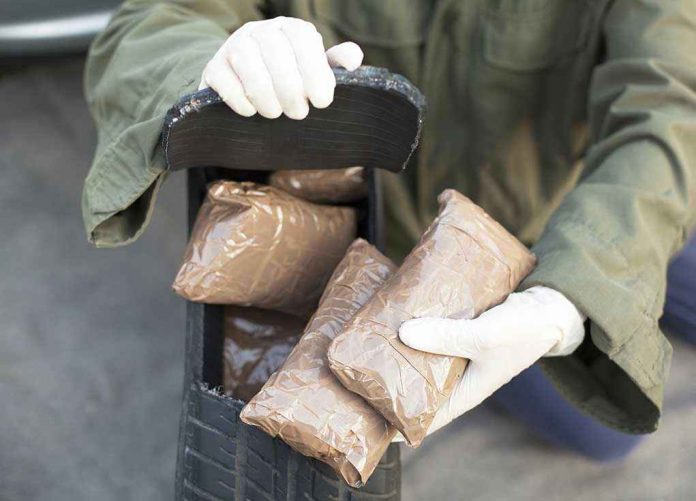
For the first time ever, the U.S. has branded a Venezuelan state-linked cartel as a terrorist organization, exposing the Maduro regime’s deep entanglement in narco-terrorism and escalating the fight against foreign criminal threats.
Story Snapshot
- The Trump administration designated Venezuela’s Cartel de los Soles as a Foreign Terrorist Organization (FTO) and Specially Designated Global Terrorist group.
- Direct ties between the cartel and Nicolás Maduro highlight state complicity in drug trafficking and terrorism.
- U.S. sanctions now target financial networks supporting the cartel and its criminal allies.
- This marks a pivotal shift, expanding terrorism designations to state-linked criminal organizations in Latin America.
U.S. Terrorist Designation Targets Venezuela’s State-Linked Cartel
On November 24, 2025, the Trump administration designated Venezuela’s Cartel de los Soles as a Foreign Terrorist Organization, a move that directly confronts the regime of Nicolás Maduro and its criminal operations.
This unprecedented action demonstrates a robust national security posture and signals that the U.S. will no longer tolerate state-backed narco-terrorism on its doorstep. By expanding terrorism designations to include state-linked entities, the administration is making clear that foreign regimes complicit in organized crime pose a direct threat to American interests.
Cartel de los Soles, originating in the early 2000s among Venezuelan military officers, evolved into a powerful criminal network embedded deep within the state apparatus. The cartel’s operations, allegedly overseen by Maduro and senior officials, have enabled vast drug trafficking routes, provided support to Mexican cartels like Sinaloa, and fostered alliances with other violent groups.
As Venezuela’s institutions collapsed under economic and political crises, the regime increasingly relied on illicit revenues, further entrenching these criminal elements in government power structures.
Sanctions, Asset Freezes, and International Pressure Intensify
The U.S. Department of the Treasury, State, and Justice have enacted sweeping sanctions to disrupt the cartel’s financial networks and choke off illicit funding streams. Assets belonging to designated individuals and entities have been frozen, and transactions linked to the cartel are now subject to strict legal scrutiny.
These measures extend to allies such as Tren de Aragua and the Sinaloa Cartel, intensifying international cooperation to dismantle transnational criminal organizations. While the Venezuelan government has dismissed these actions as politically motivated, the sanctions sharply limit their ability to move money and maintain power.
Venezuela’s official response has been categorical denial, claiming the U.S. designation is part of a destabilization campaign. Nonetheless, the facts presented by U.S. authorities, backed by independent policy analysts, reveal a consistent pattern of state complicity in narcotics trafficking and organized crime.
The Treasury’s statements underscore Maduro’s regime as a facilitator of narco-terrorism, making this designation a critical step to safeguard American sovereignty and stem the flow of drugs and criminal influence from South America.
Broader Implications for U.S. Security and Policy
This landmark decision holds profound consequences for U.S. security, hemispheric relations, and the future of counterterrorism policy. By labeling Cartel de los Soles a terrorist group, the U.S. sets a precedent for targeting state-linked criminal networks, not just traditional terrorist entities.
This approach could embolden regional governments to take similar measures, disrupt illicit revenue sources, and isolate hostile regimes. However, experts caution that humanitarian and diplomatic efforts may face new obstacles as the lines between crime and terrorism blur.
The move also raises the stakes for Venezuelan migrants and the diaspora, who may encounter increased scrutiny and legal challenges as a result.
Financial institutions across the Americas must now boost due diligence on Venezuelan transactions, while law enforcement agencies strengthen cross-border cooperation to combat evolving threats.
The designation’s impact will ripple through diplomatic channels, potentially escalating tensions but also reinforcing the U.S. commitment to defending the Constitution, border security, and conservative values against foreign criminal encroachment.
As the Trump administration continues to prioritize national security and sovereignty, this aggressive stance against narco-terrorism sends a clear message: America will confront and defeat those who threaten its freedoms, safety, and way of life.
Sources:
U.S. Department of the Treasury: Treasury Sanctions Venezuelan Cartel Headed by Maduro
U.S. Department of State: Terrorist Designations of Cartel de los Soles





